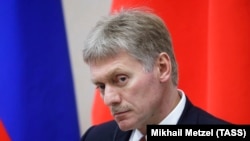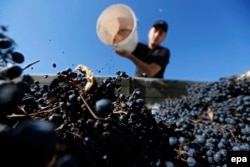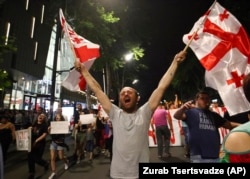On Monday, June 24, Russian presidential spokesman Dmitry Peskov commented on Russian government actions targeting Georgia in response to anti-Moscow protests there.
Peskov, who claimed there was “no political conflict” between the two countries, criticized Georgia for what he called “Russophobic hysteria” after a visiting Russian parliamentarian, Sergei Gavrilov, addressed Georgia's parliament from the speaker’s seat, sparking violent protests in the capital of Tbilisi.
Peskov said Russia, unlike some countries, would not use “illegal” sanctions against Georgia.
"We say that we had to impose these restrictions,” Peskov said. “Russia has no intention of becoming similar [to some other countries] imposing their stance by using illegitimate sanctions. In this case, the issue at hand is restrictions concerning flights and temporary restrictions, not sanctions."
This is misleading.
Economic sanctions are widely viewed as commercial or financial penalties against countries or individuals that are used as foreign policy instruments.
These measures include Non-Tariff Barriers (NTBs), which, according to the United Nations, can entail:
- Sanitary and Photosanitary measures
- Technical barriers to trade
- Pre-shipment inspection and other formalities
- Contingent trade protective measures
- Non-automatic licensing and quality control measures
- Price control measures, additional taxes and charges
- Finance measures
- Measures affecting competition
- Trade-related investment measures
- Government procurement restrictions
- Export-related measures
On June 21, Russian President Vladimir Putin signed a decree temporarily banning passenger flights to Georgia to “protect Russian citizens … from criminal and other unlawful actions.”
The following day, Russia’s transportation ministry banned two Georgian airlines from flying to Russia.
The travel embargo will come into effect on July 8.
An estimated 1.4 million Russians visited Georgia in 2018, and the Russian state news agency TASS quoted Georgy Kepuladze, chairman of the Georgian non-governmental organization Society and Banks, as saying the country could lose $250-$300 million annually, which is 8-9% of its tourism revenue.
Russia’s travel industry and ordinary Russians viewed the decision as political, and not safety related, AFP reported.
Then, on June 24, Russia’s Federal Service for the Oversight of Consumer Protection and Welfare (Rospotrebnadzor), announced it has tightened controls over the quality and safety of Georgia-made alcoholic beverages entering Russia.
The consumer protection watchdog claims that between 2014 and 2018, 203,000 liters of Georgian-manufactured alcoholic beverages failed to meet quality control standards – a nearly three-fold increase.
In 2006, Russia banned the import of Georgian and Moldovan wines at a time when political relations were souring with both countries.
Russia subsequently banned the import of popular Georgian mineral water brands on quality control grounds.
However, Natalya Petrova, an expert on the certification of mineral waters, told the BBC that none of the Borjomi [mineral water] samples tested during that time had resulted in any violations, prompting the Georgian parliament’s then-speaker, Nino Burjanadze, to accuse Russia of enacting “an economic embargo.”
According to Irakli Cholobargia, head of marketing at Georgia's state-run National Wine Agency, Russia imported 52 million bottles, or 91% of Georgia’s wine exports before the 2006 embargo. After the embargo was imposed, Georgian wine exports dropped from over $80 million in 2005 to as little as $29 million in 2007, AFP reported.
Russia’s ban on Georgian wine and mineral water was lifted in 2013, soon after then Georgian President Mikheil Saakashvili, a leading critic of President Vladimir Putin, was barred from seeking a third presidential term.
“We have seen the Russian consumer-protection agency politicize trade and ban certain products when political relations with Russia deteriorate, not only in Georgia, but also in the Baltics, Moldova, Ukraine, and Central Asia,” Sergi Kapanadze, the Dean of the Caucasus School of Governance at the Caucasus University in Tbilisi wrote in a 2014 policy memo for the European Council on Foreign relations.
Additionally, a range of scholars have identified Russian restrictions against Georgia as “sanctions.”
Polygraph.info therefore finds that Peskov’s claim Moscow is only introducing restrictions, and not sanctions, to be misleading.










